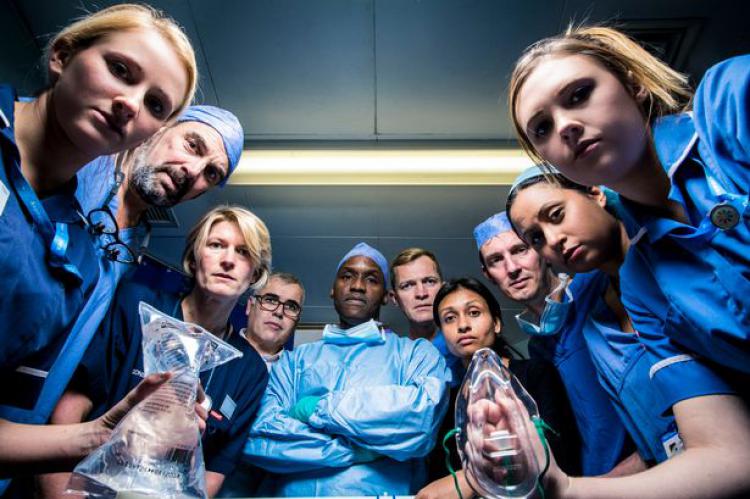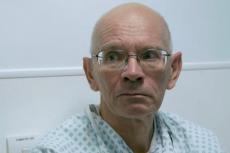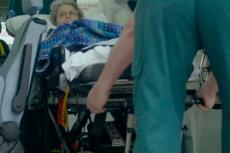Hospital: How do you solve a problem like the NHS?
As you watch this fly-on-the-wall documentary series, episode one, filmed at St Mary's Hospital in Paddington, west London, you begin to see the enormous pressure and emotional strain the staff and patients are under, and at times, this was very difficult to watch.
By Andy Simon @AndySimon55
At the moment, and at what I find personally to be, the very comfortable age of 56, I am in pretty good health.
And long may this trend continue.
But I also realise, that at the age of 56, I most likely have, more days behind me, than I have in front. In time, this body I have been occupying, will soon start to decline to such an extent, that I will no doubt probably require some understandable, medical attention.
It's natural I suppose. It's like the old man said . . .
"Nothing lasts forever."
When that time comes, I would like to think that after spending a lifetime paying into the NHS, through taxation, I would be getting the care and (when necessary) the treatment I need to keep me enjoying a reasonably good quality of life, for as long as possible.
But after watching Wednesday night's BBC documentary on the NHS, I do wonder if that care and treatment will be attainable.
The documentary, "Hospital", shown on BBC2, at 9pm, was primarily about the every day pressures, faced by the NHS, and the consequences of the decisions made by those on the front line.
As you watch this fly-on-the-wall documentary series, episode one, filmed at St Mary's Hospital in Paddington, west London, you begin to see the enormous pressure and emotional strain the staff and patients are under, and at times, this was very difficult to watch.
One of the patients, Simon, a cancer sufferer, was waiting to have a potentially life saving operation carried out on his oesophagus.
Simon; a quiet, gentle and cheerful man, had already been prepped for his operation only to be later told by the surgeon who was to perform the operation, that his much needed surgery would now not be taking place, due to an incoming emergency.
An elderly woman (Janice) with a ruptured aorta, was on her way via ambulance, and this meant that the ICU bed previously allocated to Simon, was now no longer available.
For here is the catch.
Simon's dilemma was made even more frustrating after the surgeon explained that while there is enough surgeons, anaesthetists and nurses to perform his and Janice's operations, there is only one intensive care bed left available.
This meant that either Janice gets priority, and thus receives her life-saving operation (providing of course; Janice does not die whilst on route) or he does.
What a heck of a decision to have to make!
One of the senior staff at St Mary's; Lesley Powls, is the hospital's site director. She regards her role as the equivalent of an Air Traffic Controller, making sure that the beds, doctors and patients are all in the right place, at any given time.
And it was she, who made the decision, to prioritize Janice.
As I watched; I learned that it took Janice 4 hours in the back of an ambulance to get from Norfolk to St Mary's. And this made me wonder why should it be, that an emergency such as Janice's, would have to travel so far and for so long, in order to get the treatment she clearly, desperately needed?
How does it come to this? Something is very wrong.
The heart breaking scene between Simon and his surgeon, illustrates and captures the daily conditions, situations and pressures that those in NHS hospitals are having to cope with.
It also makes me wonder how widespread this crisis is, for it is a crisis, and we are only observing it from one NHS trust.
Just how bad is it all over the country?
How bad is it really; out there?
For me, this I think is the whole point of the entire documentary; to show the viewer as much as they can, just how bad things really are, and indeed, just how much pressure the NHS is really under, due to what always seems to be the case, a lack of funding.
As you watch, you begin to consider the high possibility, that In any system of healthcare, there are going to be those who will get the treatment they need, and there will also sadly, be those who will not be so fortunate.
Through watching this documentary, you also get to see right up close; the emotions of the very people, who have the rather unenviable and difficult daily task, of making those extremely hard, and conscience nagging decisions.
You also get to see how they resolve these often painful, and rather horrible dilemmas. "The elastic's nearer to breaking now than perhaps it ever was", said the Head of Intensive Care.
He's not kidding!
Thankfully Janice and Simon received their respected treatments. But this does not in any way suggest to me, that this happy outcome, for Simon and Janice, is commonplace.
There are unfortunately, many occasions where such happy outcomes, despite the efforts of the hospital staff, again due to lack of beds, facilities and funding, are quite simply, not possible.
As the documentary approached its end, we learned that Simon, after finally getting his operation, after the third attempt, six weeks later, sadly died, soon after he contracting a blood and immune disorder, known as Hemophagocytic Lymphohistiocytosis (or HLH, for short) and is a life-threatening immune deficiency.
It can (apparently) affect people of all ages
I should at this point offer my own opinion of the current state of the NHS. And I would hazard a guess, that some would agree with it. The NHS is in big trouble, it is in a crisis, and I feel no matter how much money is poured into it, things will not really change.
Quite frankly; there's just way too many people for our current healthcare system to cope with. Perhaps we may one day see our healthcare go the way of the United States, with their Private Health Care Insurance?
One thing's for certain, the BBC's Hospital documentary clearly shows how bad things within the NHS have got, and as yet, have not provided any realistic or plausible solution for this crisis?
But perhaps that was not the intention of the makers, when they filmed this documentary over six weeks between October and November 2016. Perhaps later episodes will reveal more?
Time will tell.
In the meantime, this review is respectfully dedicated, to the memory of Simon, to his friends and family. I am certain that the heartfelt good wishes, respects, condolences and thoughts of those who may read this review, will be with them.
The BBC's, "Fly On The Wall", and often heart wrenching documentary, "Hospital", continues next Wednesday on BBC2, at 9pm. It's well worth watching.
Thanks for reading.
###





There is 1 Comment
Great job Andy
I have enjoyed your review, The NHS is in dire stats at the moment sadly through.